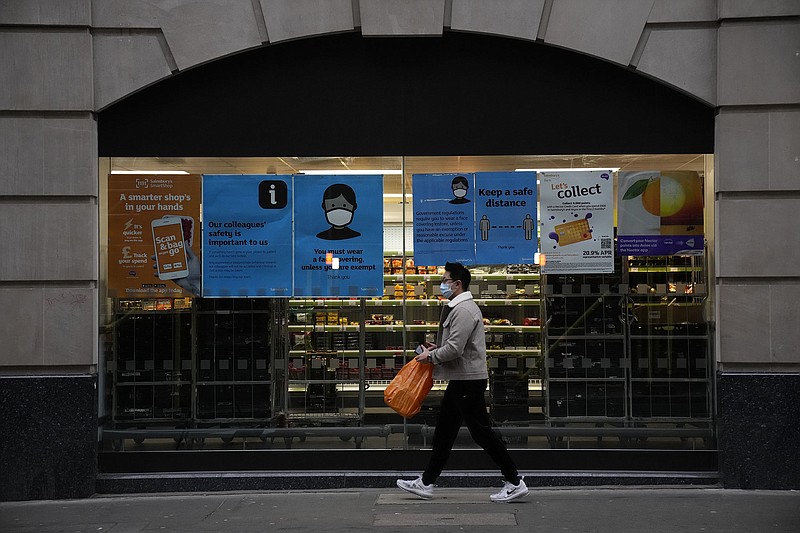LONDON -- Most coronavirus restrictions, including mandatory face masks, were lifted in England on Thursday after Britain's government said its vaccine booster rollout successfully reduced serious illness and covid-19 hospitalizations.
From Thursday, face coverings are no longer required by law anywhere in England, and a legal requirement for covid-19 passes for entry into nightclubs and other large venues has been scrapped.
The government last week dropped its advice for people to work from home, as well as guidance for face coverings in classrooms. From next week, restrictions on the number of visitors to nursing homes will also be lifted.
England's so-called "Plan B" measures were introduced in early December to stop the rapid spread of omicron from overwhelming health services and to buy time for the population to get its booster vaccine shot.
Officials said Thursday that almost 84% of people over 12 in the United Kingdom have had their second vaccine dose, and that of those eligible, 81% have received their booster shot.
[Video not showing up above? Click here to watch » arkansasonline.com/128ukparties/]
Hospital admissions and the number of people in intensive care units have stabilized or fallen, and daily cases have dropped from a peak of over 200,000 around New Year's to under 100,000.
Health Secretary Sajid Javid said the vaccine rollout, testing and development of antiviral treatments have combined to make "some of the strongest defenses in Europe," allowing a "cautious return" to normality. But he added that "as we learn to live with covid, we need to be clear eyed that this virus is not going away."
British health officials have said they are planning a longer-term, post-pandemic strategy that treats covid-19 more like the flu.
Meanwhile, British Prime Minister Boris Johnson, fighting to save his job, insisted Thursday that he was "absolutely not" delaying publication of a report into a career-threatening scandal over parties held in Downing Street during lockdown.
"I'm afraid you've got to let the independent inquiries go on," said Johnson on a visit to Wales, where he posed for the media in a high-visibility jacket and hard hat, explaining why the much-anticipated report had not been released.
When asked whether it would published in full he replied, "Of course."
[Video not showing up above? Click here to watch » arkansasonline.com/128downingst/]
In London, the content of the document that could force Johnson from power was on Thursday the subject of an unusual tussle, the outcome of which could determine the prime minister's fate.
After being briefed on the findings of Sue Gray, a senior government official, into the allegations engulfing Downing Street, London's Metropolitan Police on Tuesday launched its own investigation into possible lawbreaking in Johnson's home and office.
And, while that was a blow to Johnson, it might also have thrown him an unlikely lifeline -- even if it is temporary.
At the request of Downing Street, Gray is removing from her document any material that police think could compromise their investigation into the more serious cases she uncovered that may have broken the law. Only once that is done will the report be handed to Johnson and then published.
The stakes are high for Johnson because many Conservative lawmakers are waiting for Gray's document before deciding whether to press for a no-confidence motion against the prime minister.
He is accused of misleading Parliament -- normally a resigning matter -- about what he knew about the gatherings in Downing Street reported by the British media.
[CORONAVIRUS: Click here for our complete coverage » arkansasonline.com/coronavirus]
To secure a no-confidence motion, 54 Conservative lawmakers must write to a senior colleague requesting one. Because the process is conducted in secret, it is unclear how many such letters have been submitted.
Information for this article was contributed by Sylvia Hui of The Associated Press and by Stephen Castle of The New York Times.
